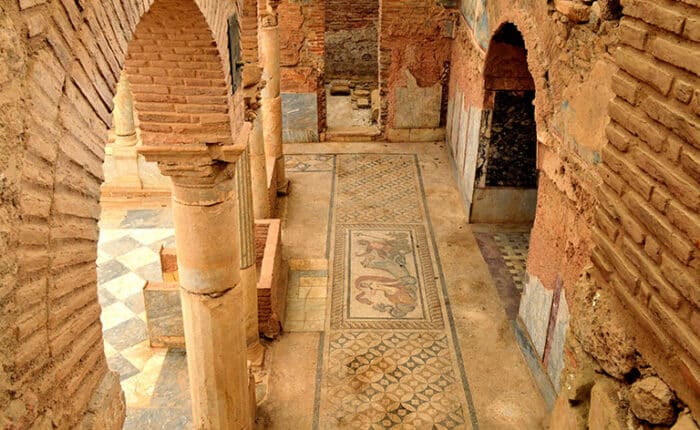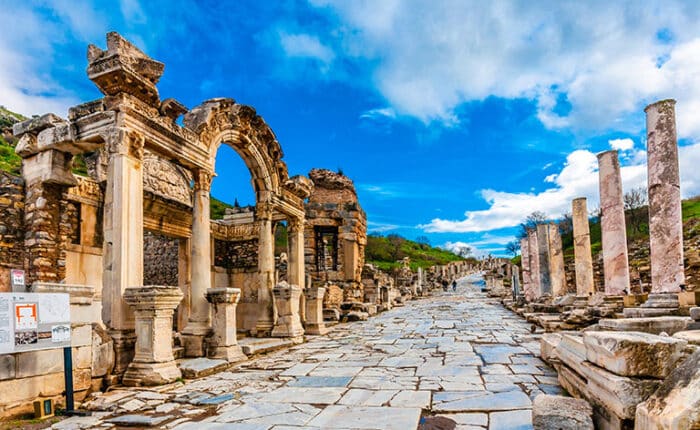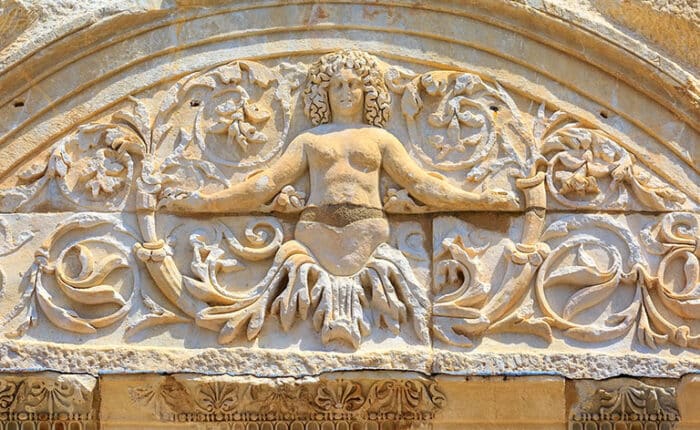Ephesus is an ancient city considered second only to Pompeii in regional importance. If you grew up in the Christian church, you might be familiar with this city through the Bible book Ephesians, which is Paul’s letter to the church at Ephesus. But this name is well-known around the Mediterranean for its rich history and power.
Ephesus was once one of the most significant commercial seaports in the entire Western world, and it remains some of the best-preserved ruins of its time. It was founded in the eleventh century BCE. and today is recognized as a World Heritage site. It’s also one of the few remaining places in the world where you can get a feel for what life was like during the golden ages of Greece, Malta, and Rome.
Legend says that Ephesus was founded around 1100 BCE by an Ionian prince named Androclos. According to the story, the oracle at Delphi told Androclos that a boar and a fish would show him the location for a new Greek settlement. One day, as the prince was frying a fish, the fish flopped out of the pan and landed in the nearby bushes, igniting the bushes and startling a wild boar out, completing the prophecy.
Another story credits the legendary Amazon warriors with founding the city. The tribe of female warriors from Anatolia supposedly named the great city after their queen, Ephesia. Regardless of its origins, within four centuries, Ephesus would be a thriving city.
In the fifth century BCE, the Ephesians built their Temple of Artemis, which has become one of the Seven Wonders of the Ancient World. The city was captured by the Persian Empire around this time, and they held it until Alexander the Great took the city back in 334 BCE. Around the first century BCE, Ephesus came under Roman rule, the time when it would hold the most wealth and power.
In its heyday, Ephesus was believed to be home to nearly 250,000 people. This set it as the fourth-largest city of its day, behind only Rome, Alexandria, and Antioch.
During the first century CE, Ephesus became vital in the spread of Christianity, and today, the tomb believed to belong to the Virgin Mary is in Ephesus. In 262, the Goths destroyed the Temple of Artemis, marking the beginning of the end for Ephesus. A massive earthquake and the decline of the harbor in the sixth and seventh centuries continued the decline. By the time the Ottoman Empire took control of the city in the fifteenth century, Ephesus was all but abandoned to the ages.
Ephesus was built on a river bend back in its day, but the continual depositing of silt has moved the coastline further and further west. Today the coast is about five miles away from the ruins of Ephesus. It’s a little less than two miles outside a city called Selcuk and about 500 miles from Istanbul, the capital of modern-day Turkey.
Ephesus is about fifty miles south of Izmir and sits just off the Icarian Coast. This sea also contains Patmos, the prison island from which the apostle John is said to have written the Revelation. The surrounding area is filled with coastal national parks and breathtaking mountain peaks dotted with astonishing historical sites.
One of the larger cities near Ephesus in Kusadasi, a resort town on Turkey’s west coast. There are some great hotels and restaurants there, and you can enjoy a thriving nightlife after spending the day in Ephesus. There are several attractions to see around Kusadasi as well.
Just off the coast of the city and connected by a causeway, you’ll find Pigeon Island, a walled Byzantine castle that once guarded the town. You can also visit the ruins of Priene, Miletus, and Didyma, Hellenistic cities just outside Kusadasi. If you’d like to see some living towns, check out Kirazli, a quaint town with some great restaurants and an amazing farmer’s market.
When you’re exploring Ephesus, you’re going to be doing a lot of walking. So you need to make sure you bring comfortable shoes, plenty of water, and lots of sunscreens. This is especially important if you’re visiting in the summer, when you may also want a hat to protect you from the scorching midday sun.
You may also want to take some snacks with you for your trip to Ephesus. There are no restaurants, stalls, or shops inside the ruins, and you may be there for a while. Just make sure you take everything you carry in back out with you – littering would be nothing less than sacrilege at this ancient site.
There are two primary ways to get to Ephesus. The first is to travel to Izmir and by plane or a private car (if you are driving down from Istanbul or Troy) then take the roads south to Selcuk or to Ephesus itself. This drive will take about an hour, and some public buses also run from Izmir daily.
You can also get to Ephesus via Kusadasi, a coastal city about twelve miles southwest of the historical site. From there you can drive up to Ephesus, about a half-hour trip. This can be a great option if you’ve come to Turkey by sea, either on a cruise or on a sailboat.
How many days you spend around Selcuk will depend on how thoroughly you want to explore Ephesus and what else you want to do in the area. In general, most people find they can see everything they want to in Ephesus in a day or two. But you may want to give yourself three days to go back and explore every wondrous site in the city and enjoy the culture of Selcuk or include more sites nearby.
One of the easiest ways to get around Ephesus is to travel with a guided tour that will ease your navigation to the city and around the area if you are especially on a tight schedule and visiting Turkey for a short time. So, all you have to do is show up on time at the hotel lobby, get picked up, and enjoy the day to its most. But if you prefer to use public transport and do your own touring, there are some buses and taxis from surrounding cities that you can take into Ephesus.
Once you’re in the city, you’ll need to walk most of the time which should be avoided especially during summer months. If possible, try to get your driver to drop you off at the Upper Gate on the southeast side of the city. It’s a much more pleasant walk downhill through the city than hiking up from the northwest Lower Gate.
Once you’re in Ephesus, you’ll have difficulty deciding which attractions you want to see most. The Gymnasium of Vedius and the Stadium are both glorious, well-preserved structures. The Church of the Virgin Mary is where the Third Ecumenical Council is believed to have met in 431. And the Square of Verulanus and the Great Baths are more than worth the trip.
The Arcadian is an amazing stone-paved street lined with columns and remnants of buildings. The Great Theater is one of Ephesus’s most impressive structures, both for its architecture and its claim that the apostle Paul once preached here. And, of course, you’ll want to see the site where the magnificent Temple of Artemis once stood.
The Terrace Houses of Ephesus are also some of the city’s most breathtaking remaining structures. The oldest of these six houses were built as early as the first century BCE and was in use for more than six centuries. Today two of the houses are restored and available for you to visit.
You won’t want to miss Hadrian’s Gate, located at the junction of Curetes Street and the Marble Road. The gatehouse was three stories tall, and it remains some of the most impressive ruins in Ephesus.
The Celsus Library is also shockingly well-preserved, featuring a stunning two-storied columned facade. It was first built as a tomb for Gaius Julius Celsus Polemaeanus. In time, it became the third-richest library in the ancient world, bested only by the libraries at Alexandria and Pergamum.
Many people who visit Ephesus stay in nearby Selcuk, an adorable small town with cobblestone alleys and traditional whitewashed houses. Its proximity to Ephesus means that visitors staying there can walk to the ruins when they like, a convenience that the larger cities don’t offer. There is a range of hotels in Selcuk that can suit any budget and style preference.
However, Kusadasi is also within easy reach of the ancient city. If you’re looking for higher class experience, you may want to stick to Izmir. This can also give you greater access to some of the other amazing sites spread throughout the region.
If this is not your only sea-view accommodation in Turkey; then we will recommend Sirince Village in the first place which is a gorgeous town in the mountains with fresh air and away from tourist crowds, especially after the tour buses leave.
If you’re from a colder part of the world, you’ll be fine going to Ephesus almost any time of year. January and February are the coldest months, but even then, the temperatures bottom out around 5°C (41°F). However, around July and August, the temperature can soar to as high as 40°C (104°F) in the middle of the day.
In general, spring and fall are the best times to visit Ephesus. April, May, October, and November are the best from a weather standpoint when the temperature is neither hot nor cold. If you’re worried about rain, go towards the beginning or end of summer; it hardly rains in the summertime.
Turkish food benefits from a long history filled with diverse cultures and an imperial influence. This makes it one of the finest cuisines in the world, and you should take the opportunity to enjoy it while you’re visiting Ephesus. It’s a beautiful fusion of Central Asian, Middle Eastern, Eastern European, and Balkan cuisines.
Many Turkish meals will center around vegetables, rice, and bread. Lamb is a common staple, and many meals start with soups or a cold dish of vegetables cooked in olive oil. You’ll find rich breakfasts and glorious use of spices in the food you eat around Ephesus and don’t miss the fresh fish either at a seaside restaurant around Kusadasi or Kordon in Izmir.
When you’re visiting Ephesus, knowing a few pro tips can make your trip safer and more enjoyable. First of all, make sure you carry plenty of bottled water with you. The summers in Turkey are hot, and there are no places in Ephesus to get water.
As we mentioned, you should start your tour from the Upper Gate in the city. If you get tired, take a break at the beautiful Terrace Houses opposite the Hadrian Temple. It’s also best to start your visit in the early morning or late afternoon to avoid both the heat and the cruise ship crowds.
Staying safe in Turkey is mostly a matter of being smart and taking standard precautions. Use all the usual safety measures you would when traveling anywhere else in the world, including hiding money and essential documents in an inside pocket of a jacket. Walk confidently and try to get a hotel in an area of town near restaurants and stores that are open late at night.
In general, Turkey is a relatively safe area of the world. So long as you keep your wits about you and take the usual safety precautions, you shouldn’t have any trouble.



Ephesus was an amazing town, and today its ruins are one of the most incredible legacies of the Greek and Roman empires. You can see where the Temple of Artemis stood, walk the streets that the Virgin Mary once trod, and stand in the theater where the apostle Paul once preached. You can also see the ruins of one of the most incredible cities that ever existed on the coast of the Icarian Sea.
If you’d like to see Ephesus for yourself, check out the rest of our site at Made in Turkey Tours. We can show you the best of Troy, Pamukkale, Istanbul, Cappadocia, and more. Check out our Ephesus tours and start experiencing the ancient world for yourself today.
When you get done in the area around Ephesus, you may be wondering where you should go next. Bodrum on the southern coast of Turkey features another of the Seven Wonders of the Ancient World, and Pergamon and Assos are amazing cities with incredibly rich histories. Troy is another amazing option further north up the west coast.